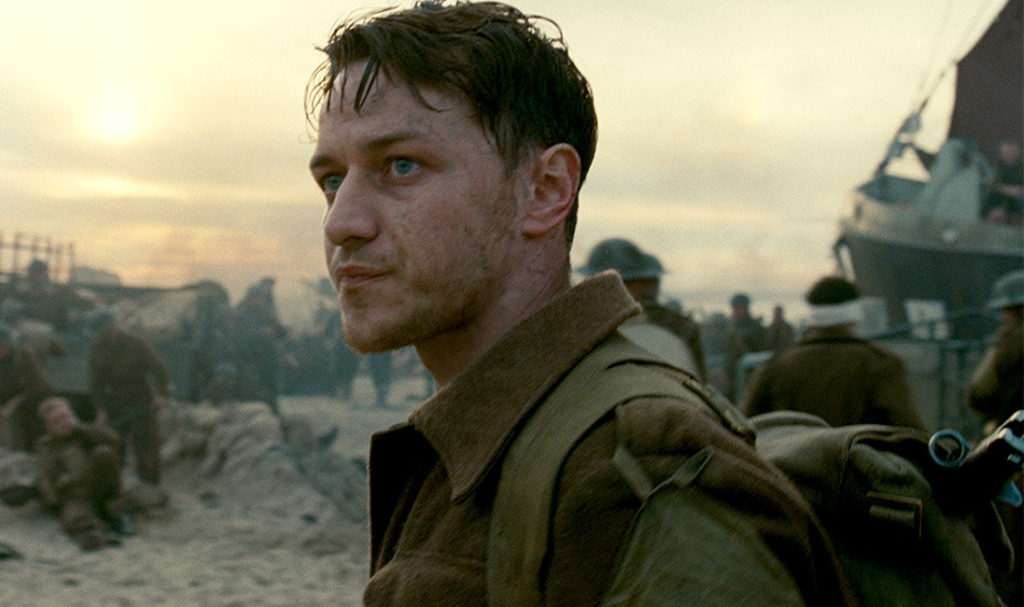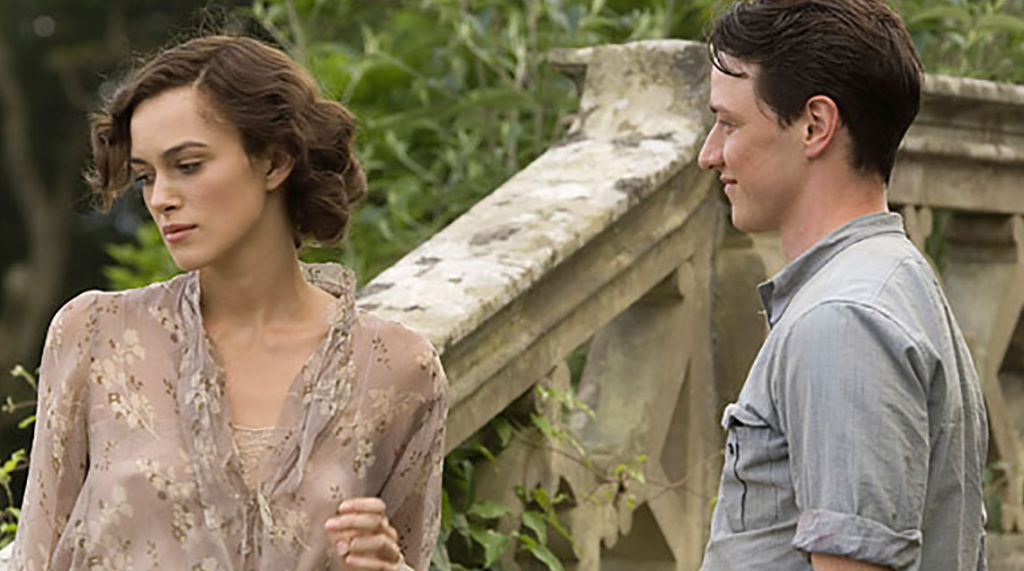Joe Wright’s “Atonement” — based off the compelling novel by Ian McEwan — is a tragic story, more so tragic because of the epoch of its time period and the chemistry between its two leads. It’s a story, as readers of the McEwan’s novel know, that isn’t meant to have a happy ending; but one that is meant to show — through detailed visuals, stunning performances, and a well-crafted story — a misunderstood event, a lie, and the devastation on three peoples’ lives proffered as a result of it. Winning an Academy Award for ‘Best Achievement in Music Written for Motion Pictures, Original Score’ (and nominated for ‘Best Picture’), “Atonement” is a period piece and a love story of superlative design.
The setting for “Atonement” is a posh English estate in the years before World War II, centering around a well-to-do family, seen mostly through its children: namely 13-year-old Briony Tallis (Saoirse Ronan), who is an aspiring writer, and her older sister, Cecilia (Keira Knightley). Adults are around; but it’s through these children — alongside a trio of cousins (Felix von Simson, Charlie von Simson), and Lola (Juno Temple) — that the film’s tragic arc is set. Added to the mix are a lower class servant (Brenda Blethyn) and her son Robbie (James McAvoy), who has managed to graduate from Cambridge and is slated for medical school under the charity of the family’s patriarch.
In a wonderful scene in the summer, shot by a sun-soaked fountain — and suggested through subtext and unspoken words — Cecilia and Robbie are shown to be in love. In a clever way, “Atonement” is filmed in a bizarre sort of chronology. We see this — and other scenes — from the point of view of those they happened to and those who observed them, often with different interpretations. It is through this way that we see how a slight misunderstanding between Cecilia and Robbie at the fountain is seen much differently, and much more alarmingly, by Briony, influenced, doubtless, by her young age and a crush she has on Robbie herself. Her interpretations of this event — and her discovery of a tryst between Cecilia and Robbie (coupled with a later suspected sexual assault of Lola in the shadowed estate grounds late at night) lead her to finger Robbie as the suspect, which casts him out of their life, first into prison, and then into the horrors of World War II from which salvation seems all but impossible.
“Atonement,” the novel itself written in just 2001, has the heart and tortured spirit of stories that came before. The most stark comparison that comes to mind, from me, is Hugo’s penitential “Les Misérables;” a novel that sunk its characters deep into despair, becoming the true miserable ones of its title, until we often thought no hope could exist for them. With expert cinematography (Seamus McGarvey is the Director of Photography) “Atonement” paints its bleak landscape, full of wartime atrocities, its protagonists caught in their clutches. Cecilia has become a wartime nurse — as has Briony; the former out of necessity and duty, the latter seeking an impossible forgiveness for a transgression she’s made that can’t be forgiven. And while Cecilia accepts her lot in life dolefully, if not remorsefully, we see it’s Briony that perhaps suffers the most.

The production design enhances the film, most crisply in its scenes at the English estate; most despairingly in its scenes during the war. Possibly its most accomplished scene exists as we see Robbie and company (the two most prominent Daniel Tays and Nonso Anozie) stagger through the beaches at Dunkirk in a massive pan, which I learned was shot in single take and enhanced with CGI. We see such sights as the carnage of the soldiers left to die, tattered, un-sailable ships that can’t take them home, and soldiers carrying out the soul-crushing duty of shooting wounded horses, point blank, to the moaning of the wounded nearby. The smell of the sea moments prior intoxicated Robbie. Upon receiving it, however, a starkly depressing vision of lost hope is found.
The film is filled with stellar scenes — scenes of war, or solitude, intercut with the resignation of both Cecilia and Robbie to their circumstance. Two of the most powerful scenes in the movie include, first, Robbie, Cecilia, and Briony coming to a head in dreamlike fashion in an apartment while Robbie is on leave — the former sharing a brief, stolen moment, the latter begging for a forgiveness that can never be offered. The second scene is equally powerful: a now-adult Briony (Romola Garai) consoles a dying soldier with a fatal head wound. He thinks she’s someone else; and through this interaction we see Briony wish for a better life for all three of them, a life where she’s forgiven for what she’s done, and a life where Cecilia and Robbie get to experience the love soulmates unequivocally long for. Shying away from spoilers, reality paints with a different brush, a brush where mistakes — even innocent or naive ones — have irreversible consequences.
“Atonement” is a wonder. It’s filmed with slowness, depth, and an urgency that only true love can offer. It’s filmed, also, with the hopelessness and dolor that accompanies war, where there are truly no victors but only victims; and with the sense of tragedy that accompanies the ones caught in its grasp. The film has notes of upper class privilege and lower caste toil, but is subtle, worked in as an undertone to a movie that needn’t make a strong statement of such as 2019’s socially conscious “Knives Out.” Class isn’t the point of this movie, but is love, loss, and — as seen in the film’s superlative closing scene — atonement; which may, of course, not be possible in any kind of realistic way when consequences this grave are the result of misjudgment — even if that misjudgment comes as the result of youthful naïveté. A sad, tragic film, and certainly one of 2007’s best.


